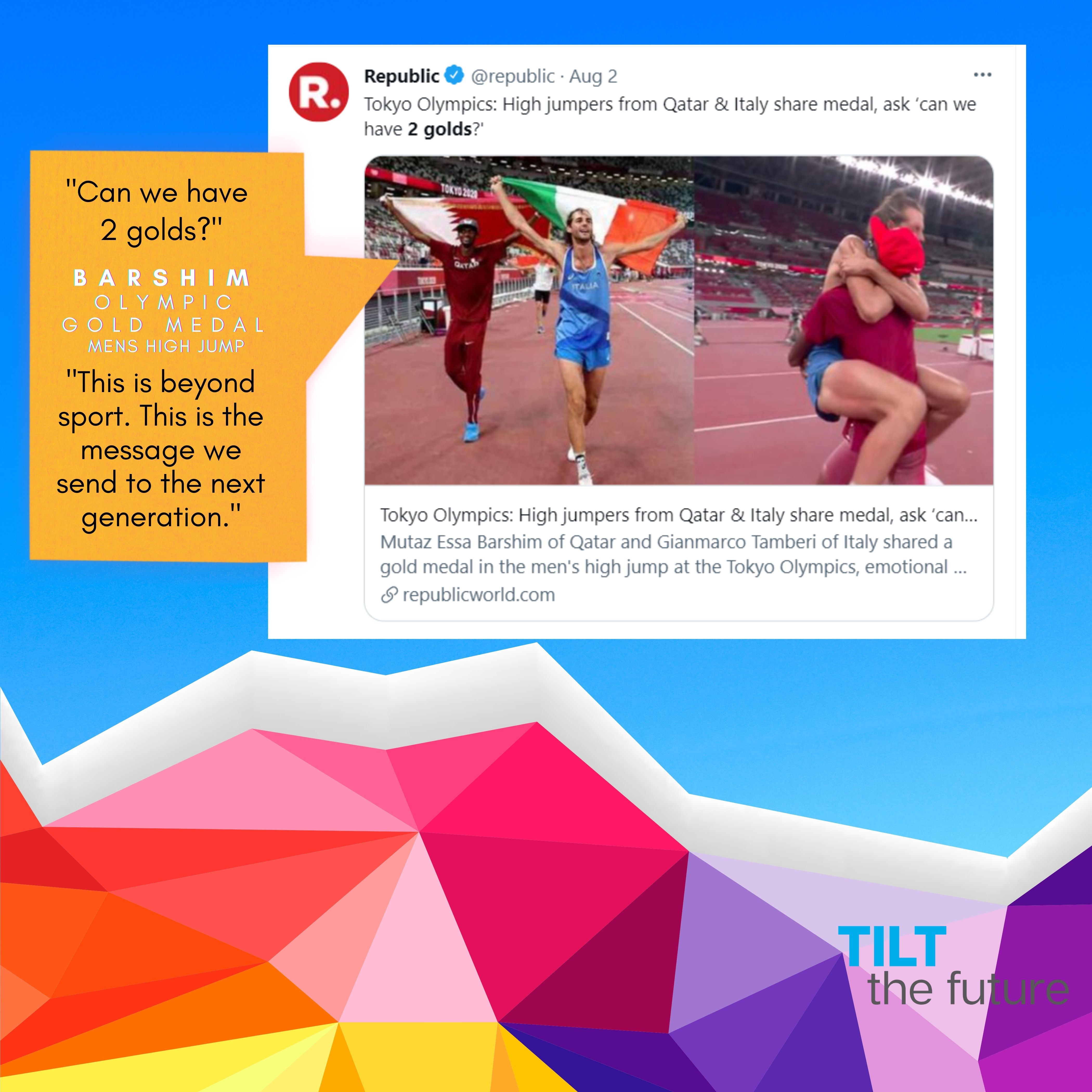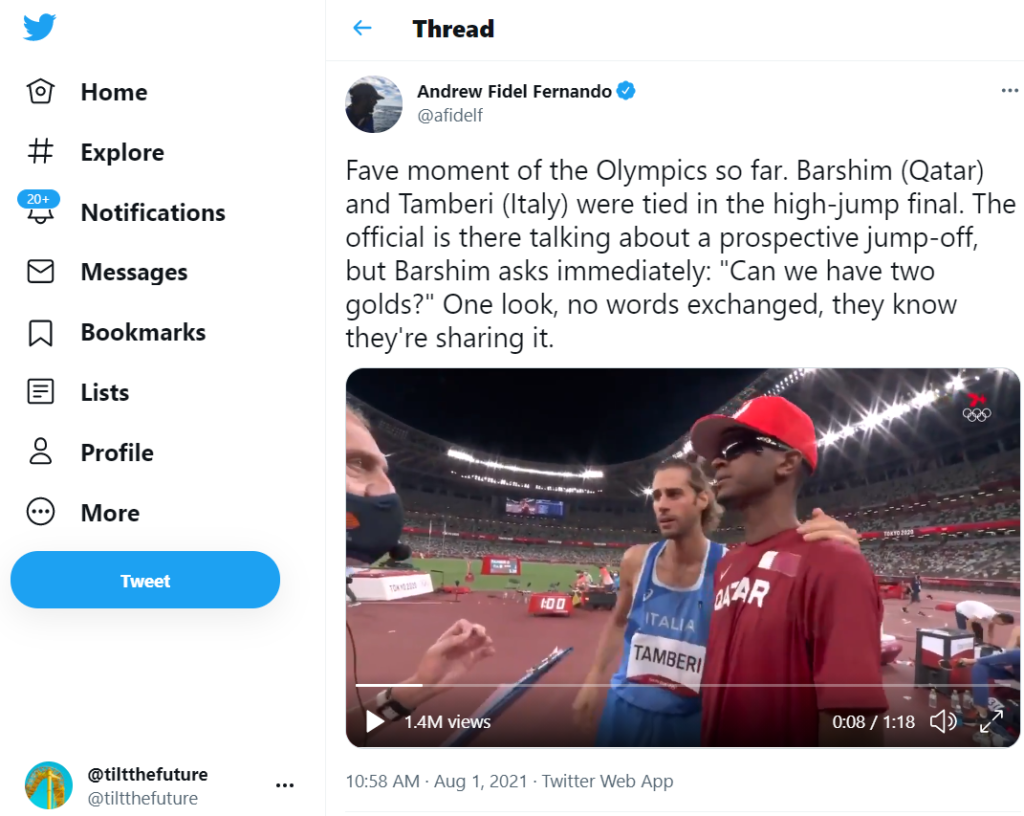
05 Aug A tale of two golds
“Can we have two golds?” asked Barshim, making the Impossible suddenly possible.
“This is beyond sport. This is the message we deliver to the young generation.” Barshim
A story of fulfillment – and also friendship
This is a tale of fulfillment, of friendship and of turning “big I” Impossible into possible.
It is a story of two Olympians, each going after that pinnacle in their sport: an Olympic gold medal.
This is also the story of the long game.
Playing the long game
And if anyone understands the concept of playing the long game, it has to be an Olympic athlete! These individuals often take a childhood interest and turn it into a passion. They catch the eye of a coach when they make the difficult appear easy. And that is when they realize they have an above average skill or aptitude, giving them the opportunity to join a very elite group of people. These humans will take on a unique challenge. They will commit to hours of repetition, days of drudgery, years of steady commitment so that they may represent their sport for their country at the Olympics. And in the end, their standing will be defined by millimeters and a split of hundredths of a second.
Angst & ankles
For most athletes the road to the Olympics is paved with angst and injury. And it was no different for the two stars of this story: 30-yr-old Mutaz Essa Barshim of Qatar and 29-yr-old Gianmarco Tamberi of Italy. These high jumpers each had something to gain, and something to prove.
Tamberi was having a fabulous season in 2016. He cleared his personal best at 2.39m at the European Championship in Monaco, only to break his ankle minutes later, attempting to clear 2.41m. Facing a possibility that he might never compete again, he watched from the sidelines at the 2016 Rio Olympics. It was a bitter way to end that season. But he chose to battle back. Now he was looking for reentry, redemption and he was targeting gold in these games.
The road was equally challenging for his biggest competitor. Barshim was coming back from his own ankle surgery in 2018. And he was looking to complete his personal Olympic medal collection of a bronze (London Olympics 2012) & a silver (Rio Olympics 2016) with the gold in Tokyo.
Battling back together
Sharing an injury, they each knew what it took to get back into Olympic form. Knowing the mental fortitude it required, the competitors supported each other through the hard battles back. Over time they each won the honour of representing their respective countries at the Tokyo Olympics.
Their friendship deepened. Each wished the other higher and better. Why? In an echo of JFK’s 1962 challenge to set humans on the Moon speech
“not because (it’s) easy, but because (it’s) hard. …
Because that challenge is one that we are willing to accept, one we are unwilling to postpone, and one which we intend to win.”
Each also knew that in winning gold one of them would be disappointed.
And it all comes down to that one Olympic day
The long recovery. The long wait. Having to deal with the interruption and delay that COVID brought to the picture.
Finally, here they were. Side by side at the same track on the same day.
They each cleared the bar at 2.37 meters. When it was raised to 2.39 they – along with a number of other jumpers – failed to clear it on each of the three tries.
A jump-off?
Both men were now tied. The obvious way forward to determine the podium finish was a jump-off. But high-jump has a rarely-used rule that Barshim decided to explore with the officials:
“Can we have two golds?”
The rest, as they say, is the stuff legends are made of. The memory of the lanky 6’3″ Italian jumping for glee with his 6’2′ friend is only surpassed by the joy of watching each athlete place that precious Olympic gold medal around the neck of their friend.
Brotherhood
“He’s one of my best friends. Not only on the track but outside of the track. We’re always together almost. True spirit, true sportsman spirit, coming here and delivering this message.”
— Barshim
It is a story of empathy: of knowing how close they had both come to career-threatening injuries, of the hard fight back to Olympic-level fitness, and of knowing how much that demanded of them mentally and physically.
This is the story of setting lifelong relationships and mutual respect over lifetime achievements and momentary wins.
Both are valid. Both are important.
And sometimes – just sometimes – with a little creativity we find we can indeed have both.
Together – a better way forward
“This is beyond sport. This is the message we deliver to the young generation.”
— Barshim
#MakeTakeTalk is our Call To Action
What did you take away from this?
Looking towards the Future of Work (or the Now of Work as it has quickly crept up on us during COVID) how could we translate these lessons of mutual support and camaraderie into our places of learning and work?
We face short-term concerns such as the variants from the pandemic and longer-term challenges such as the climate. Is collaboration and the long game the better way forward ![]() for humanity?
for humanity?
Is there a way we all can win?
Make: If we play the long game, what is possible? Make a list.
Take: Mental health has been a big conversation at these Olympic games. Take a minute to support someone in your circle with a call or a text to show your concern for their well being.
Talk: What will you say to “the young generation” when you use this moment to inspire them?
CREDIT & THANKS; DEFINITIONS & RESOURCES:
- JFK speech was given at Rice University Texas on September 12, 1962, available with the transcript from the JFK library
- TILT the Future – my podcast and blog discusses how little ideas, small shifts and minute moments can result in monumental changes in our lives https://karenadesouza.com/blog/
- Find a version of this thought for today article on LinkedIn, Instagram, and Medium
- Photo, audio & video credits:
- Credit for the tweets to @afidelf, @republic
- BBC News YouTube channel
- Karena de Souza using Canva




No Comments